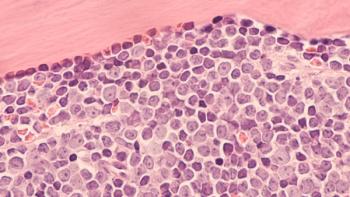
Notably, of the 38 participants who remained on treatment, 37 have switched to less frequent dosing and all have maintained responses.

Notably, of the 38 participants who remained on treatment, 37 have switched to less frequent dosing and all have maintained responses.

Using biosimilars and generics as well as getting patients connected with manufacturer copay assistance or grant programs can reduce their out-of-pocket costs.

Clayton Irvine, PharmD, MBA, MS, notes that although these options help to lower the cost of care, quick, widespread implementation remains difficult.

INCA033989 is a monoclonal antibody that selectively targets mutant calreticulin oncogenic function.

These results indicate the combination’s long-term effectiveness in a population with limited treatment options.

Rahul Banerjee, MD, FACP, discussed his presentation at the International Myeloma Society 2024 Annual Meeting on available T cell-directed therapies for myeloma treatment, including CAR T-cell therapies and bispecific antibodies.

Banerjee addressed factors to consider when selecting a regimen, the available treatments in this category, and their key differences.

Thomas Chen, MD, PhD discussed his innovative approach to brain cancer treatment through NeOnc, Inc.

The decision is based on positive results from the phase 3 LAURA trial.

Artificial intelligence shows promise in improving diagnosis and treatment for patients with multiple myeloma.

Early diagnosis of monoclonal gammopathy of undetermined significance (MGUS) and smoldering multiple myeloma (SMM) may mitigate progression.

Automation and artificial intelligence can also aid significantly in reducing time-consuming tasks and improving efficiency for pharmacists, allowing them more time with patients.

Although Madabhushi said there are emerging tools for clinical decision support, he said there is a greater need for tools further downstream in the post-diagnosis stages.

However, early diagnosis still presents challenges and limits treatment options.

About 72% of the observed pregnancies after allogeneic hematopoietic cell transplantation occurred spontaneously, whereas remaining pregnancies were a result of assisted reproductive activities.

Compared with chemotherapy, datopotamab deruxtecan (Dato-DXd) did not achieve a statistically significant overall survival (OS) in patients with inoperable or metastatic HR+/HER2-low or negative breast cancer.

The meeting will focus on the basic, preclinical, and clinical aspects of myeloma, including precursor disease, high-risk disease, immunotherapies, novel biomarkers, and more.

William Carroll, PharmD, network vice president of pharmacy at Hackensack Meridian Health, discusses his hopes for the new partnership.

The decision expands treatment options for patients with transplant-ineligible newly diagnosed multiple myeloma (NDMM).

Ponsegromab displayed significant and robust increases in body weight at the completion of the study for all doses.

Shifting from a vertical, isolated care model into a collaborative approach can improve the clinician and patient experience.

The CRAFT (NCT04551521) trial is still ongoing to assess findings in the remaining patient arms.

Improvements in survival outcomes were seen among those at high risk for DLBCL who received 6x R-CHOP21 + 2R.

Amivatamab-vmjw is a fully-human bispecific antibody targeting EGFR and MET with immune cell-directed activity.

Using ultrasound and clinicopathological characteristics, the studied nomograms effectively evaluated recurrence risk in HR-/HER2+ and HR+/HER2+ breast cancer.

Patients with for HER2-positive breast cancer have an increased risk of developing brain tumors.

Pembrolizumab is an anti-programmed death receptor 1 (PD-1) therapy designed to increase the immune system’s ability to detect and fight tumor cells.

The combination of amivantamab and lazertinib showed improved intracranial efficacy, progression-free survival, and overall survival for non-small cell lung cancer.

The humanized anti-butyrophilin 3A monoclonal antibody selectively activates Vγ9Vδ2 T-cells.

In 2 studies, durvalumab improved overall survival for those with unresectable hepatocellular carcinoma and event-free survival for muscle-invasive bladder cancer.